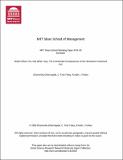| dc.contributor.author | Dhammika, Dharmapala | |
| dc.contributor.author | Foley, C. Fritz | |
| dc.contributor.author | Forbes, Kristin J. | |
| dc.date.accessioned | 2011-11-04T16:58:59Z | |
| dc.date.available | 2011-11-04T16:58:59Z | |
| dc.date.issued | 2009-06 | |
| dc.identifier.uri | http://hdl.handle.net/1721.1/66936 | |
| dc.description.abstract | This paper analyzes the impact on firm behavior of the Homeland Investment Act of 2004, which provided
a one-time tax holiday for the repatriation of foreign earnings by U.S. multinationals. The analysis
controls for endogeneity and omitted variable bias by using instruments that identify the firms likely
to receive the largest tax benefits from the holiday. Repatriations did not lead to an increase in domestic
investment, employment or R&D—even for the firms that lobbied for the tax holiday stating these
intentions and for firms that appeared to be financially constrained. Instead, a $1 increase in repatriations
was associated with an increase of almost $1 in payouts to shareholders. These results suggest that
the domestic operations of U.S. multinationals were not financially constrained and that these firms
were reasonably well-governed. The results have important implications for understanding the impact
of U.S. corporate tax policy on multinational firms. | en_US |
| dc.description.sponsorship | Foley thanks the Division
of Research of the Harvard Business School for financial support. | en_US |
| dc.language.iso | en_US | en_US |
| dc.publisher | Cambridge, MA; Alfred P. Sloan School of Management, Massachusetts Institute of Technology | en_US |
| dc.relation.ispartofseries | MIT Sloan School of Management Working Paper;4741-09 | |
| dc.subject | flypaper effect | en_US |
| dc.subject | international taxation | en_US |
| dc.subject | financial constraints | en_US |
| dc.subject | Repatriations | en_US |
| dc.title | Watch What I Do, Not What I Say: The Unintended Consequences of the Homeland Investment Act | en_US |
| dc.type | Working Paper | en_US |
